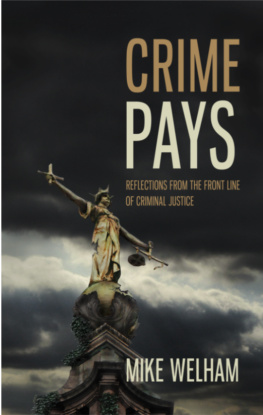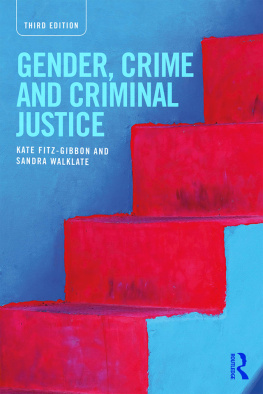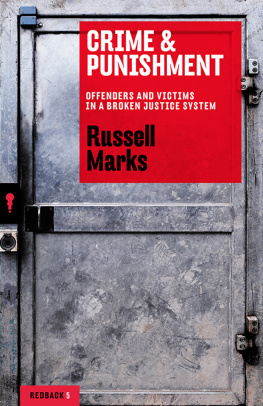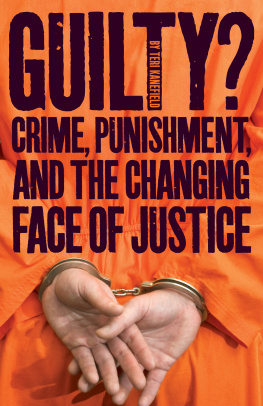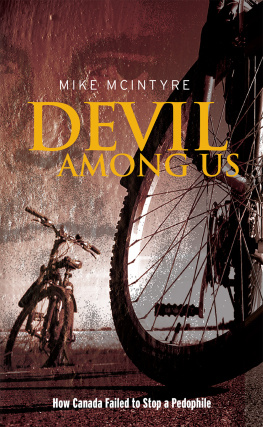CRIME PAYS
REFLECTIONS FROM THE FRONT LINE OF CRIMINAL JUSTICE
MIKE WELHAM
Copyright 2012 Mike Welham
The moral right of the author has been as serted.
Apart from any fair dealing for the purposes of research or private study,
or criticism or review, as permitted under the Copyright, Designs and Patents
Act 1988, this publication may only be reproduced, stored or transmitted, in
any form or by any means, with the prior permission in writing of the
publishers, or in the case of reprographic reproduction in accordance with
the terms of licences issued by the Copyright Licensing Agency. Enquiries
concerning reproduction outside those terms should be sent to the publishers.
Matador
9 Priory Business Park, Wistow Road
Kibworth Beauchamp
Leicester LE8 0RX, UK
Tel:(+44) 116 279 2299
Fax: (+44) 116 279 2277
Email: books@troubador.co.uk
Web www.troubador.co.uk/matador
British Library Cataloguing in Publication Data.
A catalogue record for this book is available from the British Library.
Matador is an imprint of Troubador Publishing Ltd
Thanks
Those who put pen to paper often receive assistance which is invaluable. I am no different and particularly thank the following for their contributions.
Ashwyn Smythe who stepped into the breach with a red pen. That said, the final cut is mine alone.
Nicky, Church Minister JP, who shared many of my views and opinions, for her invaluable contribution.
Jacqui, who has endured years of my muttering about the growing flood of injustice in our society.
The magistrates with whom I sat, who gave up their valuable time in an attempt to bring reality to justice.
Society Crime
Parental Control?
The prosecutor representing the local authority put forward the case against the woman in the dock. She was a single mother and was being prosecuted for not ensuring that her two daughters aged almost fifteen and almost fourteen attended school. She was one of many attending court that day for the same offence. It is of course a legal requirement for all children to be schooled until the age of sixteen. She had been co-operative with the local authority staff and had in fact been active in getting the girls to attend school. But as the responsible adult she was held to account if they failed to attend and remain in school.
The defendant told us that as a single parent she had to work and in fact had two jobs. This meant that she relied on her daughters attending school. She had, over a period of time, received numerous warnings about their non attendance and had meetings with the school management to try and resolve the situation. She had taken both girls to the school and watched then enter the building. They just walked through the corridors and out of another door and out of school. She had confronted them but they took no notice of her. She then took them to school and deposited them into their classrooms. As soon as they could, they just walked out of the school. She had lost pay due to having to take time off because of their actions.
We heard that the two girls were very upset at seeing their mother in court but they did not want to go to school. It was boring and they learned nothing. They hated it. It was explained to them that their mother could be fined and even go to prison. Nothing seemed to make any difference, school was not on their agenda. So we, as the bench, were faced with having to take a course of action. We could fine the defendant and there may have been an option of a short prison sentence. None of these options were going to get the two girls into school. The defendant had cooperated with the authorities and taken action to get the girls to school, but all had been ineffective.
We took the view in this case that a full discharge was appropriate. The defendant was grateful and even the local authority people in court understood our reasoning and accepted the verdict. We hoped that they could resolve the situation and that the girls would return to school.
However, the other cases of failing to attend school were not the same. We heard of intimidation and threats of violence as well as total non cooperation from parents. In court it was not what we wanted to hear and the outcome was that a number of fines were handed out. It was interesting to note that some schools were not sorry to see children not attending because when they were there, they were disruptive. The problem is that the disruptive children often come from disruptive homes and the situation perpetuates itself so the schools will then have children who follow the pattern. That situation is made much worse because there is no discipline either in the home or at school. The outcome is more people in court.
Violence in Schools
The Association of Teachers and Lecturers (ATL) surveyed more than 1,000 teachers in March 2010. From the evidence gained it showed that 89% of staff had dealt with low level disruption such as talking and not paying attention, but over 50% had reported verbal attacks, and nearly 40% intimidation. Some 83% of staff had reported physical aggression such as pushing and shoving, while 48% had reported the use of fists and 42% the use of legs. The survey found that over a quarter of school and college staff have had to deal with physical violence from a student, and just over a third of teachers had been confronted by an aggressive parent or guardian.
In fact, a report in the Guardian newspaper said that physical attacks are far more common in primary schools than secondary schools, with teachers reportedly being threatened, pushed, scratched, punched, bitten, kicked and spat at. Teachers said the failure of many parents to act as good role models was leading to deteriorating behaviour in lessons. In some cases, staff said mothers and fathers became abusive after staff attempted to discipline their children. [ Guardian 29th March 2010]
ATL general secretary Mary Bousted said she had found, from her time as a teacher, that she had never got to meet the parents she had wanted to meet the most. She said:They were simply absent from their childrens lives. We must say that there are certain standards we need you to adhere to to bring up your children.
Staff in state schools reported higher levels of disrespect, verbal abuse, physical attacks and intimidation than those in private schools.
The then Schools Minister, Vernon Coaker, is reported as saying that: Good behaviour and an atmosphere of respect should be the norm in all schools. We have given head teachers clear legal powers to enforce discipline which means they can get tough on poor behaviour without fear of being taken to court, including using reasonable force to control or restrain pupils.
One head of department at a state secondary school said: I have been physically assaulted twice both times violent behaviour was aimed at another student but in their rage they hit me and sexually assaulted twice. I feel that we get no support from government they have no idea of the reality of inner city schools.
Another senior teacher from a state primary said: I have had a threat to my life from a parent because I told a child to complete their homework during part of their golden time. It was threatened that they and their family would kill me when I came to or from school.
A female secondary school teacher said: I have been trapped in an office by a father and older brother of a student who were angry that hed had his gold trainers confiscated until the end of the day. Two weeks ago I had a parent come in looking for me. He didnt actually find me, but he threatened several senior staff and rampaged around the school. Police were called.[ Guardian 29th March 2010]
In December 2009, fourteen children aged five or under were being suspended from primary schools in England every day for violence against teachers or pupils. Thirty of the children sent home were aged only three. There were 830 four-year-olds disciplined for violence and 1,750 five-year-olds. Ten children aged four and twenty aged five, were suspended for sexual misconduct. Twenty, five-year- olds received fixed period exclusions for bullying and there was a slight increase in the number of suspensions among pupils aged under eleven for incidents of racist abuse, from 340 to 390. [ Guardian 31st December 2009]
Next page
